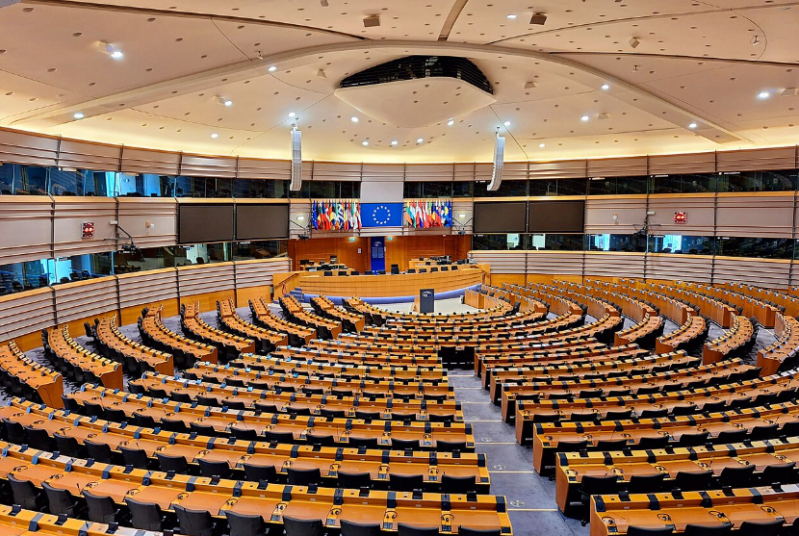
Growing transatlantic opposition against the European Union’s new online censorship law has prompted free speech advocates, legal experts and Members of the European Parliament to convene at the European Parliament this Wednesday, May 21, for a first-of-its-kind conference warning that the Digital Services Act (DSA) threatens freedom of expression and democratic norms.
Co-hosted by the Christian legal advocacy group Alliance Defending Freedom International and titled “The Digital Services Act and Threats to Freedom of Expression,” the meeting will examine the “censorial impact” of the DSA, according to a news release from ADF International.
The other hosts are Croatian Member of the European Parliament Stephen Bartulica of the European Conservatives and Reformists, and French MEP Virginie Joron of the Patriots for Europe group.
The DSA is a European Union regulation requiring large online platforms and search engines, such as X and Meta in the United States, to enforce content moderation and remove “illegal content” or face significant financial penalties. However, critics have raised concerns that the definitions of “misinformation” and “disinformation” are too vague and subjective, potentially enabling censorship.
According to an April 17 article titled “Unpacking the EU Digital Services Act,” ADF International called the DSA “deeply flawed.”
“It is built on the idea that 'bad speech' is best countered by censorship rather than robust discussion. Furthermore, the DSA gives the European Commission broad power over how platforms handle speech, which undermines the free expression essential to democratic societies,” it said.
The legal right group hopes that Wednesday’s conference will help galvanise opposition to the legal regulation—most of its provisions came into force in February 2024.
“This Wednesday’s conference is the first of its kind in the European Parliament to focus on the threats to free speech posed by the DSA, offer concrete answers on how to oppose them, and discuss the fundamental importance of freedom of expression for societal flourishing, in that context,” ADF International said.
The Bureau of Democracy, Human Rights and Labor, a division of the U.S. State Department, expressed concern about the law in a post on X earlier in May, writing: “The Department of State is deeply concerned about efforts by governments to coerce American tech companies into targeting individuals for censorship. Freedom of expression must be protected—online and offline.”
“Examples of this conduct are troublingly numerous. EU Commissioner Thierry Breton threatened X for hosting political speech.”
The post cited examples such as Türkiye fining Meta for not restricting protest-related content and Australia requiring X to take down a post that criticized an individual for promoting gender ideology.
“Even when content may be objectionable, censorship undermines democracy, suppresses political opponents, and degrades public safety. The United States opposes efforts to undermine freedom of expression. As @SecRubio [Marco Rubio] said, our diplomacy will continue to place an emphasis on promoting fundamental freedoms,” it said.
According to ADF International, experts are concerned the EU regulation could lead to a “lowest common denominator” approach to censorship, where the most restrictive anti-speech laws in any single EU member state could be enforced across the entire region under the act.
Croatian MEP Stephen Bartulica, one of the event’s hosts and featured speakers, said momentum against the Digital Services Act is “quickly building both inside and outside the European Parliament.”
He emphasized that concern from the United States—particularly from the State Department and members of Congress—over the DSA’s potential for censorship “should not be ignored by the Commission,” noting that “the U.S. is a vital ally of Europe.”
“This event will be a crucial part of continuing to build pressure on the DSA,” Bartulica said. “Online censorship in Europe must be rejected. I believe in free speech, not regulated speech.”
Paul Coleman, executive director of ADF International and an international human rights lawyer specializing in free speech, is also scheduled to speak at the event. In the press release, he described the Digital Services Act as “one of the most serious threats to online free speech in the digital age.”
“The move towards censorship in Europe through this framework is deeply concerning and must be challenged,” Coleman said.
“We cannot accept a transatlantic divide on free speech, where the U.S. recommits to protecting this fundamental freedom while Europe tramples on it. Freedom of expression must be protected and upheld across the globe.”
French MEP Virginie Joron, a co-host and speaker at the event, warned that the Digital Services Act could become a “tool” for unnamed elites to control online discourse “in a desperate attempt to censor narratives that go against their own.”
“This reality is becoming increasingly evident to the world,” Joron said. “The new DSA regulation must not be allowed to become a political weapon.”
She added, “This event comes at a critical moment and represents an important step in the effort to resist the misuse of this regulation.”
ADF International believes Wednesday’s gathering will contribute to mounting pressure against the Digital Services Act.
The U.S. House Judiciary Committee has reportedly sent a letter to the European Commission expressing its concerns about the regulation.






